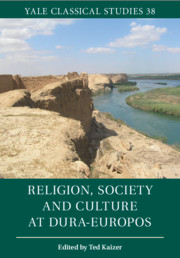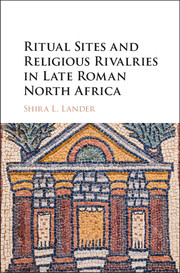Refine search
Actions for selected content:
23990 results in Ancient history
Figures
-
- Book:
- Popular Culture in the Ancient World
- Published online:
- 04 July 2017
- Print publication:
- 28 November 2016, pp vii-vii
-
- Chapter
- Export citation
Bibliography
-
- Book:
- Popular Culture in the Ancient World
- Published online:
- 04 July 2017
- Print publication:
- 28 November 2016, pp 318-364
-
- Chapter
- Export citation
11 - Interpreting the Kalends of January: A Case Study for Late Antique Popular Culture?
- from Part IV - Late Antiquity
-
-
- Book:
- Popular Culture in the Ancient World
- Published online:
- 04 July 2017
- Print publication:
- 28 November 2016, pp 237-256
-
- Chapter
- Export citation
6 - Pollio’s Paradox: Popular Invective and the Transition to Empire
- from Part II - Rome
-
-
- Book:
- Popular Culture in the Ancient World
- Published online:
- 04 July 2017
- Print publication:
- 28 November 2016, pp 129-148
-
- Chapter
- Export citation
Contributors
-
- Book:
- Popular Culture in the Ancient World
- Published online:
- 04 July 2017
- Print publication:
- 28 November 2016, pp viii-viii
-
- Chapter
- Export citation
Index
-
- Book:
- Popular Culture in the Ancient World
- Published online:
- 04 July 2017
- Print publication:
- 28 November 2016, pp 365-369
-
- Chapter
- Export citation
Part IV - Late Antiquity
-
- Book:
- Popular Culture in the Ancient World
- Published online:
- 04 July 2017
- Print publication:
- 28 November 2016, pp 235-317
-
- Chapter
- Export citation
8 - The Intellectual Life of the Roman Non-Elite
- from Part III - The Roman Empire: Greece, Rome and Beyond
-
-
- Book:
- Popular Culture in the Ancient World
- Published online:
- 04 July 2017
- Print publication:
- 28 November 2016, pp 167-188
-
- Chapter
- Export citation
Part II - Rome
-
- Book:
- Popular Culture in the Ancient World
- Published online:
- 04 July 2017
- Print publication:
- 28 November 2016, pp 89-164
-
- Chapter
- Export citation
3 - Humouring the Masses: The Theatre Audience and the Highs and Lows of Aristophanic Comedy
- from Part I - Classical Greece
-
-
- Book:
- Popular Culture in the Ancient World
- Published online:
- 04 July 2017
- Print publication:
- 28 November 2016, pp 66-88
-
- Chapter
- Export citation
Contents
-
- Book:
- Popular Culture in the Ancient World
- Published online:
- 04 July 2017
- Print publication:
- 28 November 2016, pp v-vi
-
- Chapter
- Export citation
13 - Popular Theology in Late Antiquity
- from Part IV - Late Antiquity
-
-
- Book:
- Popular Culture in the Ancient World
- Published online:
- 04 July 2017
- Print publication:
- 28 November 2016, pp 277-295
-
- Chapter
- Export citation

Religion, Society and Culture at Dura-Europos
-
- Published online:
- 18 November 2016
- Print publication:
- 17 November 2016

Ritual Sites and Religious Rivalries in Late Roman North Africa
-
- Published online:
- 17 November 2016
- Print publication:
- 24 October 2016
Bibliography
-
- Book:
- Religion, Society and Culture at Dura-Europos
- Published online:
- 18 November 2016
- Print publication:
- 17 November 2016, pp 275-300
-
- Chapter
- Export citation
9 - The Mithraeum of Dura-Europos
-
-
- Book:
- Religion, Society and Culture at Dura-Europos
- Published online:
- 18 November 2016
- Print publication:
- 17 November 2016, pp 126-143
-
- Chapter
- Export citation
Contents
-
- Book:
- Religion, Society and Culture at Dura-Europos
- Published online:
- 18 November 2016
- Print publication:
- 17 November 2016, pp v-vi
-
- Chapter
- Export citation
4 - Acculturation, Hybridity, Créolité
-
-
- Book:
- Religion, Society and Culture at Dura-Europos
- Published online:
- 18 November 2016
- Print publication:
- 17 November 2016, pp 57-67
-
- Chapter
- Export citation
12 - The Bilingual Palmyrene–Greek Inscriptions at Dura-Europos
-
-
- Book:
- Religion, Society and Culture at Dura-Europos
- Published online:
- 18 November 2016
- Print publication:
- 17 November 2016, pp 177-189
-
- Chapter
- Export citation
Contributors
-
- Book:
- Religion, Society and Culture at Dura-Europos
- Published online:
- 18 November 2016
- Print publication:
- 17 November 2016, pp xiii-xiv
-
- Chapter
- Export citation
